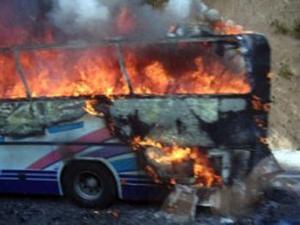AnalysisBulgaria attack shows Iran’s terror strategy
The Wednesday suicide-bombing attack by a Hezbollah operative on a bus carrying Israeli tourists on their way to a Bulgaria sea resort, an attack in which six Israeli were killed and thirty-five injured, is an indication that Iran has decided to increase the cost to Israel, and the United States and the West more generally, of a set of policies which have materially undermined Iran’s interests; Iran has built a large network of terror sleeping cells in Europe and the Americas, operated by the Iranian Quds Force, an elite international operations unit within Iran’s Islamic Revolutionary Guards Corps, and by Hezbollah, a network it intends to activate where and when it serves its interests

Bulgarian suicide-attack bus following explosion // Source: alayam.com
The Wednesday suicide-bombing attack by a Hezbollah operative on a bus carrying Israeli tourists on their way to a Bulgaria sea resort, an attack in which six Israeli were killed and thirty-five injured, is an indication that Iran has decided to increase the cost to Israel, and the United States and the West more generally, of a set of policies which have materially undermined Iran’s interests:
- The ever-harsher economic sanctions on Iran, the latest round of which has now substantially reduced Iran’s ability to export oil
- The coming military strike by Israel, or an Israel-U.S. coalition, on Iran’s nuclear facilities – a strike which is now a near-certainty as successive rounds of talks between the P5+1 and Iran over Iran’s nuclear program have proved fruitless
- The continuing deterioration in the position of the Assad regime in Syria, a regime which is the only regional ally Iran has
- The crippling effect the removal of the Assad clan from power in Syria will have on Hezbollah, the Lebanese Shi’a group which Iran has been using as its agent
Iran also wanted to retaliate against a campaign launched by the Mossad, Israel’s secret service, to kill Iranian scientists involved in Iran’s nuclear weapons program.
From what U.S. and Israeli intelligence authorities have been able to gather, the suicide mission in Bulgaria shows that Iran and has built a vast network of terror sleeper cells in countries in Europe and the Americas.
These terror cells are handled – in the intelligence world lingo, as in “handler” – by the Iranian Quds Force, an elite international operations unit within Iran’s Islamic Revolutionary Guards Corps, and by Hezbollah.
Members of these cells may be activated in one of two ways: They are either instructed by Iran – typically, through Hezbollah, so Iran may maintain deniability – to hit a specific target; or, as was the case in Bulgaria on Wednesday, an Iranian agent is activated and instructed to look for a target of opportunity within a given time frame. The agent then decides whether to attack a tourist bus, a Synagogue, or another target.
Western intelligence sources say that Iran and Hezbollah distinguish between two types of targets: “local” and :strategic.” Hitting a bus or a Jewish day-school is considered local, and is the type of target a Hezbollah operative would look for when Iran issues an order to hit a target, but the operative is given the freedom to choose a target of opportunity.
Targeting an airplane, as a Hezbollah operative tried to do in Cyprus two weeks ago, before he was arrested by Cyprus police, or an Israeli diplomatic personnel, as Iranian agents tried to do in several countries in Asia last month, are considered strategic targets. These targets are specifically designated by the agent’s handlers.
The New York Times today quotes U.S. intelligence officials to say that the bomber in Bulgaria had been “acting under broad guidance” to hit Israeli targets when opportunities presented themselves, and that the guidance had been given to Hezbollah, a Lebanese militant group, by Iran, its primary sponsor.
The Wednesday attack in Bulgaria, then, is an example of an Iranian agent given instructions to search for a local target, and that he chose the group of tourists because the opportunity presented itself.
Unlike al Qaeda terrorists, Hezbollah has not engaged in suicide bombing for close to two decades now, preferring to use IEDs and, using sophisticated anti-tank and anti-ship rockets it received from Iran and Syria, more conventional military attacks. This has led Israeli intelligence to speculate that the bomber in Bulgaria may not have intended to blow himself up, but rather that he had a “work accident.”
The killing in Bulgaria, painful as it is for the families of the victims, carries a broader message. It requires Israel, the United States, and European countries to accept the fact that terrorism is one tool Iran may increasingly use as its economy is being squeezed and its position in region undermined, and which it will certainly use as a retaliatory measure if its nuclear weapons facilities are attacked.
